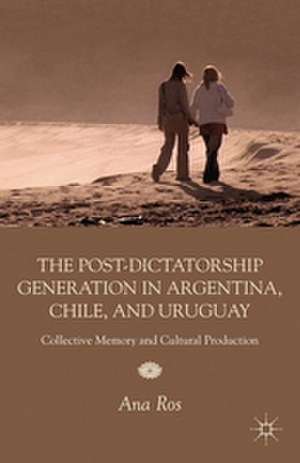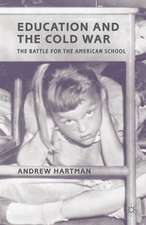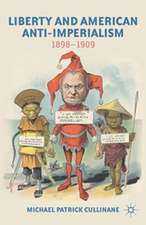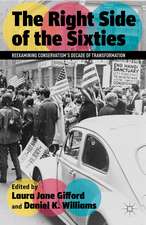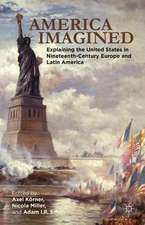The Post-Dictatorship Generation in Argentina, Chile, and Uruguay: Collective Memory and Cultural Production
Autor A. Rosen Limba Engleză Hardback – 8 iun 2012
| Toate formatele și edițiile | Preț | Express |
|---|---|---|
| Paperback (1) | 636.80 lei 6-8 săpt. | |
| Palgrave Macmillan US – 8 iun 2012 | 636.80 lei 6-8 săpt. | |
| Hardback (1) | 640.88 lei 6-8 săpt. | |
| Palgrave Macmillan US – 8 iun 2012 | 640.88 lei 6-8 săpt. |
Preț: 640.88 lei
Preț vechi: 753.97 lei
-15% Nou
Puncte Express: 961
Preț estimativ în valută:
122.64€ • 128.96$ • 101.33£
122.64€ • 128.96$ • 101.33£
Carte tipărită la comandă
Livrare economică 17 aprilie-01 mai
Preluare comenzi: 021 569.72.76
Specificații
ISBN-13: 9780230120600
ISBN-10: 0230120601
Pagini: 256
Ilustrații: XII, 268 p.
Dimensiuni: 140 x 216 x 15 mm
Greutate: 0.43 kg
Ediția:2012
Editura: Palgrave Macmillan US
Colecția Palgrave Macmillan
Locul publicării:New York, United States
ISBN-10: 0230120601
Pagini: 256
Ilustrații: XII, 268 p.
Dimensiuni: 140 x 216 x 15 mm
Greutate: 0.43 kg
Ediția:2012
Editura: Palgrave Macmillan US
Colecția Palgrave Macmillan
Locul publicării:New York, United States
Cuprins
Why Write about the Post-Dictatorship Generation? PUSHING THE ENVELOPE: MEMORY FORMATION IN ARGENTINA Collective Memory from the Dictatorship to the Present Living the Absence: The Children of the Desaparecidos Introducing Silences, Taboos, and Margins Building Bridges Between Generations The Past in the Present, the Present in the Future CHILE AND URUGUAY: MEMORY STRUGGLES IN NEGOTIATED TRANSITIONS Chile. Overcoming the Stunned State of the People Uruguay. Memory Struggles against the Clock The Never-Ending Path to the 'Never Again'
Recenzii
"The Post-Dictatorship Generation in Argentina, Chile, and Uruguay provides a refreshing, three-dimensional account of human rights debates in the Southern Cone, stressing the views of groups too young to have experienced state persecution directly, who must nonetheless grapple with a society forever altered by the period of tyranny. The blending of a sociological and a literary approach (including due attention to film and poetry) is unusual, difficult to bring off, and accomplished beautifully here."
- Christopher Mitchell, New York University
"Ana Ros offers an engaging and nuanced portrait of the post-dictatorship generation in Argentina, Chile, and Uruguay. Through her keen analyses and illuminating comparisons of diverse cultural productions, she shows how those who grew up amid state terror have challenged static, official narratives in the interest of constructing more just societies and layered understandings of the past."
- Michael J. Lazzara, University of California, Davis
"Focusing on the post-dictatorship generation's cultural production, Ros presents a novel perspective on the ongoing collective memory construction process. In this excellent study, the author thoroughly analyzes films, books, and artistic installations revealing how young people are reclaiming this history as their own and installing it in the public sphere with their distinctive approach, gaze, and voice. In doing so, they reaffirm the strong presence ofthis past in their present and challenge their parents' generation by triggering intergenerational dialogues that demystify heroes, question hierarchies, and demand explanations about memory monopolies, political activism, armed struggle, and the roles of average citizens."
- Susana Kaiser, University of San Francisco, author of Postmemories of Terror: A New Generation Copes with the Legacy of the 'Dirty War'
- Christopher Mitchell, New York University
"Ana Ros offers an engaging and nuanced portrait of the post-dictatorship generation in Argentina, Chile, and Uruguay. Through her keen analyses and illuminating comparisons of diverse cultural productions, she shows how those who grew up amid state terror have challenged static, official narratives in the interest of constructing more just societies and layered understandings of the past."
- Michael J. Lazzara, University of California, Davis
"Focusing on the post-dictatorship generation's cultural production, Ros presents a novel perspective on the ongoing collective memory construction process. In this excellent study, the author thoroughly analyzes films, books, and artistic installations revealing how young people are reclaiming this history as their own and installing it in the public sphere with their distinctive approach, gaze, and voice. In doing so, they reaffirm the strong presence ofthis past in their present and challenge their parents' generation by triggering intergenerational dialogues that demystify heroes, question hierarchies, and demand explanations about memory monopolies, political activism, armed struggle, and the roles of average citizens."
- Susana Kaiser, University of San Francisco, author of Postmemories of Terror: A New Generation Copes with the Legacy of the 'Dirty War'
Notă biografică
Ana Ros is an assistant professor at SUNY-Binghamton, where she teaches Latin American Cinema and Literature. She studied Literature at the University of Uruguay and received her Ph.D. in Romance Languages from the University of Michigan. In her research, she critically examines contemporary Southern Cone cultural production in its socio-political context. Her interests include collective memory, intergenerational transmission, the post-dictatorship generation, exile and emigration, class relations, and the use of popular culture in literature. Her publications include: Young Argentine Filmmakers: Remembering the Past from a Present of Crisis in Latin American Studies: Critiques of Contemporary Cinema, Literatures, Politics and Revolution (Academica Press, 2011); Forgiveness and Reconciliation as Generational Questions, Argentina 1982-2011 in Dissidences: Hispanic Journal of Theory and Criticism (2011); Leaving and Letting Go as Possible Ways of Living Together in Jorge Gaggero s
